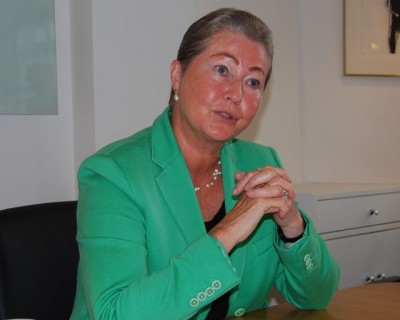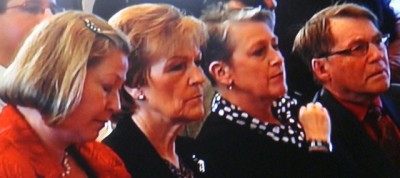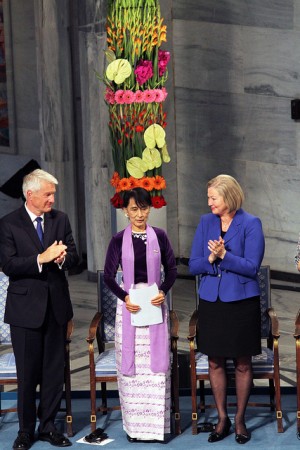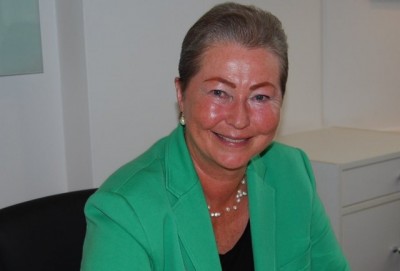The new leader of the Norwegian Nobel Committee readily admits she’ll be battling “a lot of butterflies” when, less than six weeks from now, she’ll be the one stepping out from behind the heavy wooden door at the Norwegian Nobel Institute in Oslo to announce the next winner of the Nobel Peace Prize. Kaci Kullmann Five is, however, a veteran politician accustomed to tackling challenges from heated debate on major issues to, on a more personal level, both diabetes and breast cancer, emerging with her smile intact.

“It’s probably a good thing to be nervous,” Five (pronounced “Fee-vuh”) told a group of foreign correspondents in Oslo on Tuesday. She’s learned from her earliest days in politics, when she was a novice in live TV debates, that being nervous can keep you sharp. It gave her an edge as a young, cheerful woman in an otherwise rather dour male-dominated Conservative Party. And she’s faced the media glare most of her adult life, if not on such an international scale, always known for wearing a barrette in her carefully coifed blond hair. The hair ornament became part of what was called “the Kaci effect” on politics in Norway in the early 1990s.
Now Karin Cecilie “Kaci” Kullmann Five is 64 years old and the barrette is gone after successful radiation treatments for breast cancer last year left Five without hair that’s now come back but remains short. And she’s ready to step into the spotlight on October 9, to announce the Peace Prize that will be formally awarded on December 10. While she’s bound by the will of Alfred Nobel not to reveal the content of deliberations over the winner, she spoke candidly on Tuesday about some of the inner workings of the five-member committee she now heads and how they arrive at their decision.

Five latches on to encyclopedia definitions of the Nobel Peace Prize as the “world’s most prestigious” despite all the criticism hurled at most awards. “If it didn’t have prestige, it wouldn’t be debated as much as it is,” Five reasoned, when asked by newsinenglish.no how she assesses the prize’s current reputation.
She added that even after 12 years as a member of the Norwegian Nobel Committee, she still finds it “overwhelming” to experience first-hand how important the prize is, based on the huge amount of attention it receives and the consequences awards can have. “It’s also an old prize, and part of the Nobel family,” she said, adding that “it’s a heavy responsibility” even though her chairmanship of the committee is not a full-time job and is compensated with just EUR 10,000 a year. Five allowed that she’ll never quite understand how it came about that a group of five Norwegians, often barely known within Norway itself, were given that responsibility by Swedish prize benefactor Alfred Nobel. “I don’t think he really did it for Norway’s sake,” she added, stressing that although Nobel decreed that Peace Prize committee members must be appointed by the Norwegian Parliament and reflect its makeup, it’s a separate entity completely independent from the Norwegian government. All the other Nobel prizes are awarded in Sweden by Swedish committees and organizations.
“I see that some people can’t separate the prize from Norway,” she said, a thinly veiled reference to angry and embarrassed Chinese authorities who blamed the awarding of the prize to Chinese dissident Liu Xiaobo five years ago on Norway itself and promptly curtailed diplomatic relations. But even after all her own years in politics and Parliament (the latter from 1981 to 1997), she claimed she has “never once” been approached by former colleagues who may want to exert any influence.

Most agree, however, that Five’s election as the committee’s new leader was highly political indeed, and her takeover occurred earlier this year under hotly debated circumstances in Norway. The make-up of the five-member committee changed when the party Five once headed, the Conservatives, won enough votes in the 2013 national election to form a Conservative-led coalition government with the Progress Party. That also changed the make-up of Norway’s Parliament, leaving the committee formed early this year with two members appointed by the Conservatives (Five and newcomer Henrik Syse) and one by the conservative Progress Party (Inger-Marie Ytterhorn). Five’s predecessor, the former Labour Prime Minister Thorbjørn Jagland, ended up becoming the first committee leader to be demoted against his will. He wanted to stay on as a member of the committee representing Labour, though, along with Berit Reiss-Andersen, who became deputy leader.
Five has consistently refused to discuss how or why the change came about, saying only that a “thorough debate” within the committee led to her election, and the committee elects its own leader. She flatly rejects suggestions it was done to appease the Chinese, or was in any way a rebuke of controversial awards under Jagland’s tenure. “To those who imply that I will be softer on human rights issues, well, they do not know me well,” she said. The Peace Prize to Liu Xiaobo, known as a human rights activist who remains jailed in China, “was really one of those I wholeheartedly supported,” Five insisted.
Now, she says, “my tasks are the same as his (Jagland’s)” were, to be “the face and voice” of the prize. She downplayed her own role in the selection process, stressing that the deputy leader (Reiss-Andersen) introduces candidates for consideration and the leader is the last to comment on them.

“It is not the decision of the leader (to select a Peace Prize winner),” she said. “The chair (leader) has one vote like all others. Our task is to find a candidate we can hopefully all agree on.” There ended up being 273 valid nominations this year, she said, the second-highest number ever after last year’s 278. They comprise 68 organizations and 205 individuals and the committee has now met for four of the six meetings it has to narrow down the list of candidates. The last two meetings loom over the next month to select a winner.
Five said at the outset of Tuesday’s meeting that “I can assure you we are working as a team,” to dampen any speculation that Jagland is sour and discussions difficult after he lost the committee’s leadership.
Five, who once served as Norway’s government minister for trade and shipping, now runs a consulting business and has been a member of many corporate and charitable boards of directors. She candidly admits she is “no foreign policy analyst” and noted that the committee solicits outside expert opinions on prize candidates. She said the committee is also well-aware that it’s been a target of criticism over both its interpretation of Alfred Nobel’s will and that “we know we’ll be criticized” over individual prizes. “Most of the problems that come up after an award are things we have foreseen,” she said, but the risk of criticism “doesn’t mean we can shy away from it.”
As for whether the Peace Prize has become a “political prize,” as some critics contend, Five simply shakes her head but suggests that “finding ways to peace is about politics, you don’t have to be a professor to see that.” Her most important duty, as she sees it, is to follow “the process that’s been developed over more than 100 years” since the Peace Prizes were first handed out.
“We try to do our best to keep it a prestigious prize,” she said, with an intention to now ignore and refuse comment on all speculation over the next winner until she announces it at precisely 11am on Friday October 9.
newsinenglish.no/Nina Berglund

